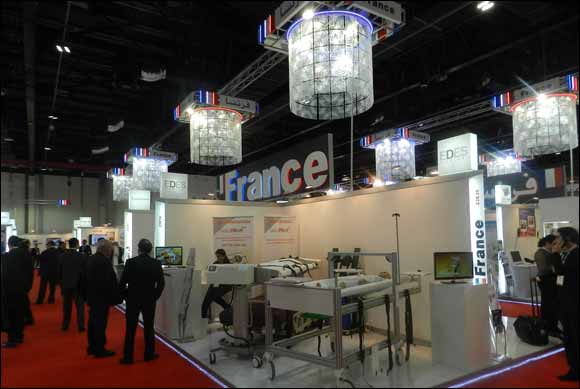
The 104 French companies attending Arab Health-Medlab, held from January 27th to 30th, 2014, will be getting even more exposure this year thanks to about 1,260 m2 in exhibition space, split up between ZA'ABEELL Hall and SHEIK RASHID Hall. Organised by UBIFRANCE – the French Agency for International Business Development – the Pavilion just had to be even larger this year so as to highlight the know-how of French medical systems companies at this tradeshow, the leading event for the sector in the Near and Middle East. In a worldwide market worth over €200b a year, the medical systems sector is especially innovative in France. Thanks to a substantial base of over 1,000 SMEs employing close to 65,000 people with know-how combining medicine, mechanics, materials physics and digital technology, France's market for medical systems is estimated at €19b, and it enhances the sector by filing about 700 new patents every year. France enjoys a high quality, internationally-acknowledged brand of medicine and a dynamically innovative approach; a great amount of technological breakthroughs in medical systems come from France: artificial hearts, mini-invasive surgery etc. This has placed the country in fourth place worldwide, behind the United States, Germany and Japan. Moreover, from a technological, scientific and clinical perspective, France also enjoys a rich ecosystem. The country is thus particularly known for its innovative potential and boasts industrial, scientific and clinical know-how in such fields as implants (artificial limbs), technical assistance, mini-invasive surgery systems and in-vitro diagnostics, as well as emerging, academic know-how among young SMEs in imaging and cardiology diagnostics. Research enjoys strong support from the Authorities, particularly through new schemes like “promising investments for the future” which have led to the creation of new enhancement organisations like the SATT (Technology Transfer Boosting Companies) and specialised competitiveness clusters, and to the development of targeted patents intended for the worldwide market. Those new schemes come on top of a large number of existing subsidies and financial aids to innovation, specifically aimed at developing start-up companies and at supporting public and private incubators. In that regard, France is seen as one of the most supportive countries for innovative companies, especially thanks to the country's research tax credit (CIR), a measure that grants tax breaks to businesses investing in R&D. Lastly, in order to boost France's commercial offer on international markets, four business families were identified by the French Government, including health (with a measure called “Mieux se soigner” - Taking better care of yourself), as priority avenues for development. This new strategy set up in 2013 was launched in a bid to meet new public health challenges worldwide and should stimulate French exports. With help from regional partners like Centre Eco and Lille Eurasanté, who will be on hand at the French Pavilion with 13 companies, the French Government's new direction will be clearly visible to all at the next Arab Health tradeshow.
|